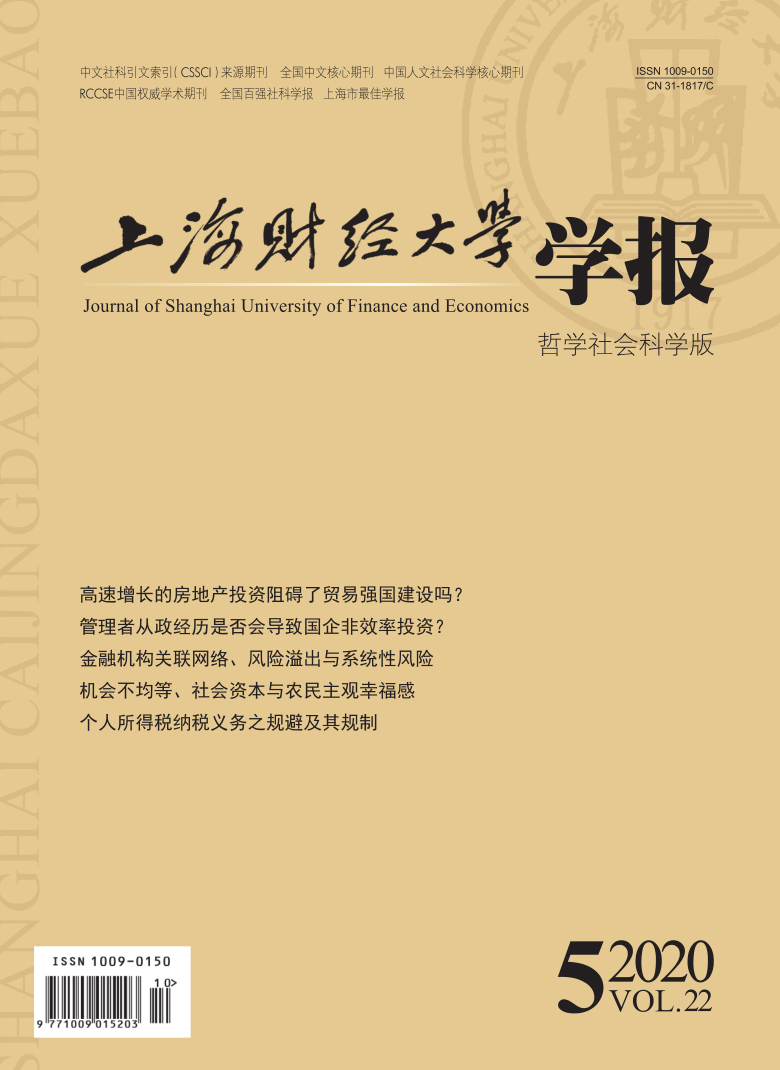文章基于CGSS 2013年及2015年数据,运用多重中介效应模型,探讨机会不均等、社会资本与农民主观幸福感的关系。研究结果表明,随着机会不均等的扩大,农民主观幸福感会下降,但社会信任和社会网络有助于提升农民主观幸福感;如果不考虑公共服务获得机会和各维度的权重,机会不均等对农民主观幸福感产生的消极影响会被低估;社会资本作为机会不均等影响农民主观幸福感的一个传导渠道,主要是通过社会信任实现的,社会网络的中介作用并不显著。基于此,建议政府在基础公共服务领域,如教育和医疗方面加大资金投入力度,并通过宣传教育、加大政府政策实施透明度等方式推进农村地区诚信建设。
机会不均等、社会资本与农民主观幸福感——基于CGSS数据的实证分析
摘要
参考文献
6 鲁元平,张克中. 社会流动影响居民幸福感吗——来自中国转型期的经验证据[J]. 财经科学,2014,(3). DOI:10.3969/j.issn.1000-8306.2014.03.014
8 裴志军. 家庭社会资本、相对收入与主观幸福感:一个浙西农村的实证研究[J]. 农业经济问题,2010,(7).
11 汪晨,张彤进,万广华. 中国收入差距中的机会不均等[J]. 财贸经济,2020,(4). DOI:10.3969/j.issn.1002-8102.2020.04.004
14 Bartolini S,Bilancini E,Pugno M. Did the decline in social connections depress Americans’happiness?[J]. Social Indicators Research,2013,110(3):1033–1059. DOI:10.1007/s11205-011-9971-x
16 Bjørnskov C. The multiple facets of social capital[J]. European Journal of Political Economy,2006,22(1):22–40. DOI:10.1016/j.ejpoleco.2005.05.006
17 Brockmann H,Delhey J,Welzel C,et al. The China puzzle:Falling happiness in a rising economy[J]. Journal of Happiness Studies,2009,10(4):387–405. DOI:10.1007/s10902-008-9095-4
18 Clark A E. Are wages habit-forming?Evidence from micro data[J]. Journal of Economic Behavior and Organization,1999,39(2):179–200. DOI:10.1016/S0167-2681(99)00031-1
19 Clark A E. Inequality-aversion and income mobility: A direct test[R]. DELTA Working Papers, 2003.
20 Clark A E,Frijters P,Shields M. Relative income,happiness and utility:An explanation for the easterlin paradox and other puzzles[J]. Journal of Economic Literature,2008,46(1):95–144. DOI:10.1257/jel.46.1.95
21 Easterlin R,Morgan R,Switek M,et al. China’s life satisfaction,1990-2010[J]. Proceedings of the National Academy Sciences,2012,109(25):9775–9780. DOI:10.1073/pnas.1205672109
22 Ferrer-i-Carbonell A,Frijters P. How important is methodology for the estimates of the determinants of Happiness?[J]. The Economic Journal,2004,114(497):641–659. DOI:10.1111/j.1468-0297.2004.00235.x
24 Helliwell J F. How’s life?Combining individual and national variables to explain subjective well-being[J]. Economic Modelling,2003,20(2):331–360. DOI:10.1016/S0264-9993(02)00057-3
25 Helliwell J F,Putnam R D. The social context of well-being[J]. Philosophical Transactions of the Royal Society B:Biological Sciences,2004,359(1449):1435–1446. DOI:10.1098/rstb.2004.1522
26 Jiang S Q,Lu M,Sato H. Identity,inequalith and happiness:Evidence from urban China[J]. World Development,2012,40(6):1190–1200. DOI:10.1016/j.worlddev.2011.11.002
27 Knight J,Song L N,Gunatilaka R. Subjective well-being and its determinants in rural China[J]. China Economic Review,2009,20(4):635–649. DOI:10.1016/j.chieco.2008.09.003
28 Knight J,Gunatilaka R. Does economic growth raise happiness in China?[J]. Oxford Development Studies,2011,39(1):1–24. DOI:10.1080/13600818.2010.551006
29 Oishi S,Kesebir S,Diener E. Income inequality and happiness[J]. Psychological Science,2011,22(9):1095–1100. DOI:10.1177/0956797611417262
31 Oswald A J. Happiness and economic performance[J]. The Economic Journal,1997,107(445):1815–1831. DOI:10.1111/j.1468-0297.1997.tb00085.x
32 Putnam R D. Making democracy work: Civic traditions in modern Italy[M]. Princeton: Princeton University Press, 1993.
34 Tokuda Y,Inoguchi T. Interpersonal mistrust and unhappiness among Japanese people[J]. Social Indicators Research,2008,89(2):349–360. DOI:10.1007/s11205-007-9235-y
35 Tomes N. Income distribution,happiness and satisfaction:A direct test of the interdependent preferences model[J]. Journal of Economic Psychology,1986,7(4):425–446. DOI:10.1016/0167-4870(86)90032-2
引用本文
张彤进, 万广华. 机会不均等、社会资本与农民主观幸福感——基于CGSS数据的实证分析[J]. 上海财经大学学报, 2020, 22(5): 94-108.
导出参考文献,格式为:






 9703
9703  9424
9424

